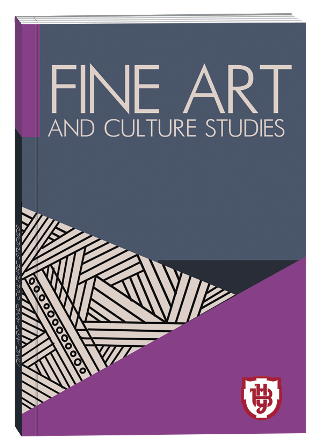VOCAL PERFORMANCE AS A FACTOR IN THE FORMATION OF ARTISTIC IMAGE IN STAGE ART
DOI:
https://doi.org/10.32782/facs-2025-2-13Keywords:
vocal performance, stage art, artistic image, interpretation, stage culture, vocal expressiveness, art education, intonation, improvisationAbstract
The article presents a comprehensive theoretical study of vocal performance as one of the key factors in the formation of artistic imagery in stage art. The necessity of overcoming the narrowly technical approach to vocal execution is emphasized, with a focus on conceptualizing the voice as a holistic artistic and semiotic instrument that functions within the framework of interpretative, communicative, and aesthetic interaction with the audience. It is argued that vocal performance in the stage context is realized through a synthesis of intonational and timbral characteristics, dynamic articulation, bodily expressiveness, the performer's psycho-emotional state, visual presence, and improvisational ability.Particular attention is given to the category of artistic image, which is considered as a multilayered structure constructed by the performer through the process of stage transformation. The article proves that the effective formation of an image in stage performance is possible only when the vocalist deeply comprehends the semantic functions of sound, dynamics, intonation, and body as integral elements of a unified artistic system. Methodological approaches to professional vocalist training are summarized, with emphasis on the significance of combining vocal-technical development with the cultivation of interpretive, imaginative, and creative thinking. The methodological basis of the research includes systematic, analytical, comparative, and art-critical methods, which enabled interdisciplinary interpretation of vocal performance in the context of stage action. The scientific novelty of the article lies in identifying the correlation between vocal expressiveness parameters and the semantic content of the stage image, as well as in the proposed authorial interpretation of stage culture as a dynamic outcome of the performer’s semantic work. The practical significance of the research lies in its applicability to professional training of students in artistic specializations, particularly within disciplines such as "Vocal Mastery," "Stage Practice," and "Interpretation of Musical Works."Prospects for further research involve the development of cognitive models of vocal thinking, studying the psychosemantic nature of intonation, and exploring stage improvisation as a mechanism of live artistic image formation.
References
Гребенюк Н. Є. Вокально-виконавська творчість: психолого-педагогічний та мистецтвознавчий аспекти: монографія. Київ, 2018. 252 с.
Растригіна А. М. Самореалізація на уроках музики як засіб становлення внутрішньої свободи особистості школяра. Наукові записки Ніжинського державного педагогічного університету. 2005. № 2. С. 41–43. URL: https://cusu.edu.ua/images/nauk_zapiski/pedagogy/Наук.записки_143_27.03.pdf
Рудницька О. п. Музика і культура особистості: проблеми сучасної педагогічної освіти: навч. посібник. Київ: ІЗМН, 1998. 248 с. URL: https://dnpb.gov.ua/wp-content/uploads/2022/09/Rudnytska_O.P.Rol_muzychnoho_spryynyattya.pdf
Солодухова Л. В. Емпатія у світі різних теоретичних підходів. Вісник ХНПУ ім. Г. С. Сковороди. Психологія. 2011. № 41. С. 204–211. URL: https://irbis-nbuv.gov.ua/cgi-bin/irbis_nbuv/cgiirbis_64.exe?C21COM=2&I21DBN=UJRN&IMAGE_FILE_DOWNLOAD=1&Image_file_name=PDF%2FVKhnpu_psykhol_2011_41_25.pdf
Соломонова О. Б. Асоціативний музичний текст: дефініція, методологія дослідження. Проблеми методології сучасного мистецтвознавства та культурології. 2020. С. 139–141. URL: http://www.mari.kiev.ua/sites/default/files/conf_docs/tesy/2020-12/Tesy-metodology_final.pdf
Сухолова М. А., Куцин Е. К., Габель О. І. Методичні підходи до формування сценічної культури вокаліста. Теорія і методика професійної освіти. 2022. Вип. 47. С. 223–226. URL: https://elibrary.kubg.edu.ua/id/eprint/3513/1/Gmirina%20S.PDF
Ткаченко Т. В. Значення засобів вокально-сценічної майстерності у формуванні професійних якостей майбутнього вчителя музичного мистецтва. Мистецька освіта: історія, теорія, технології. Харків: ХНПУ, 2017. С. 244–260.
Ткаченко Т. В. Формування вокально-сценічної культури студентів мистецьких факультетів педагогічних вузів: монографія. Харків: ХНПУ ім. Г. С. Сковороди, 2016. 307 с.
Фіцула М. М. Педагогіка вищої школи: навчальний посібник. Київ: Академвидав, 2006. 352 с. URL: https://library.udpu.edu.ua/library_files/412096.pdf
Хріков Є. М. Педагогічні умови в структурі наукового знання. Шлях освіти. 2011. № 2. С. 11–15. URL: https://dspace.luguniv.edu.ua/xmlui/bitstream/handle/123456789/2797/ped.umovi.pdf
Чехуніна А. О. Психологічна настанова як базовий аспект музичного навчання. Педагогіка формування творчої особистості у вищих і загальноосвітніх школах. 2021. Вип. 76. Т. 3. С. 54–59. URL: http://pedagogy-journal.kpu.zp.ua/archive/2021/76/part_3/12.pdf
Чехуніна А. О. Специфіка формування художнього мислення здобувачів музичної освіти. Інноваційна педагогіка. 2021. Вип. 36. С. 89–93. URL: http://www.innovpedagogy.od.ua/archives/2021/36/20.pdf
Чжан Їфу. Формування художньо-образного сприйняття у майбутніх учителів музики в процесі інструментально-виконавської підготовки: дис. ... канд. пед. наук: 13.00.02. Київ, 2016. 209 с. URL: https://udu.edu.ua/images/ data_file/viddil_aspirant/Doctor_filosofii/Kuan_Yuan/Kuan_Yuan_dis.pdf
Чурікова-Кушнір О. Д., Софроній З. В. Формування сценічної культури у майбутніх учителів музичного мистецтва на заняттях хорового класу. Духовність особистості: методологія, теорія і практика. 2021. № 2(101), ч. 2. С. 232–241.
Шапар В. Б. Сучасний тлумачний психологічний словник. Харків: Прапор, 2007. 640 с. URL: https://library.udpu.edu.ua/library_files/427530.pdf
Чінхен Г. Формування сценічної культури майбутніх учителів музичного мистецтва за допомогою естрадного співу: дис. ... канд. пед. наук: 13.00.02. Київ, 2015. 204 с.







